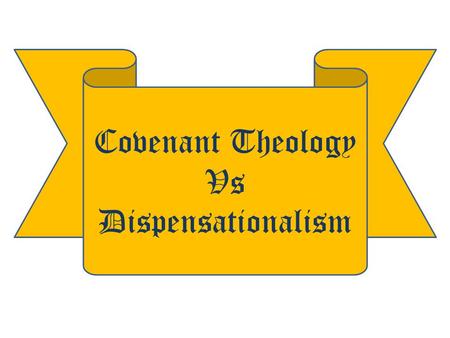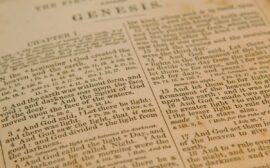By: Brian Chilton | December 11, 2017
When parsed out, theology can become quite complex. One of the deeper issues of theology deals with the differences between covenant theology and dispensational theology. When the term dispensationalism is spoken, some may think of the Left Behind series or may dismissively think of radical date setters. However, the theological system is much deeper than that.
Covenant theology and dispensational theology is divvied up according to how one views God’s future plans with the nation Israel and how one interprets prophecies in Scripture. Dispensationalists hold that God’s new covenant does not dismiss the prophecies pertaining to national Israel, whereas covenant theologians hold that the church has replaced national Israel in God’s plan. Dispensationalists hold to a literal interpretation of Old Covenant promises, whereas covenant theologians interpret the promises allegorically. Simply put—if you think that God still has plans for the nation of Israel, then you are a dispensationalist. If not, then you are a covenant theologian.
Even within the theological systems, there are minute differences that partition the theologies into varying subsets. From what I can gather, there are four major views (2 in each major system). They are the Traditional Covenant Theology (TCT), New Covenant Theology (NCT), Traditional Dispensationalism (TD), and Progressive Dispensationalism (PD).
Covenant Theology
Traditional Covenant Theology (TCT)
- Views the covenants of God with a singular view of redemption.
- Views the Old Testament with the lens of the New Testament, thus taking prophecies as allegories related to the church.
- Views three covenants throughout history: covenant of works, covenant of grace, and a covenant of redemption.
- Israel failed to follow God’s plan, therefore they were replaced by the church.
- Teaches infant baptism.
New Covenant Theology (NCT)
- The Old Testament law has been replaced by the New Testament law.
- NCT does not accept TCT’s tripartite separation of the covenants.
- Mosaic law cannot be divided.
- The new covenant fulfilled the Mosaic law, thereby making the Mosaic law inapplicable to modern Christians.
- Rejects infant baptism.
- Church began at Pentecost and Israel is not the church.
- The New Testament trumps the Old Testament.
- Like TCT, NCTs believe that Israel no longer finds a place in the plan of God.
Dispensational Theology
Traditional Dispensational Theology (TD)
- Interprets the Old Testament promises literally.
- Holds to a discontinuity between the Old Covenant and the New.
- Separates Israel (God’s earthly people) and the Church (God’s heavenly people).
- Accepts that God’s promises to Israel still apply.
- God has worked through seven dispensations of grace: innocence, conscience, human government, promise, law, grace, and kingdom.
- God has two people: Israel is his earthly people, and the church is his heavenly people.
- The church age is a parenthesis in God’s plan for Israel (when God resurrects the church, he will then focus again on Israel).
Progressive Dispensational Theology (PD)
- Holds a continuity between the Old and New Testaments.
- God moves progressively through the dispensations to save people.
- Simplifies dispensations
- Israel and the Church are distinct.
- The Church was anticipated in the Old Testament.
- Interprets the Old Testament according to the historical-grammatical hermeneutic.
- Many prophecies are viewed in an already-not-yet paradigm (some have been partially fulfilled, but will be completely fulfilled at a point in the future).
- PD is in some ways similar to covenant theologies in that PDs view God working in one, continual, linear plan; however, PDs are truly dispensational as they hold that God is not finished with Israel and will fulfill his promises made to the nation at some point in the future during the millennial reign of Christ.
Which do you find most attractive and most comparable to Scripture? Personally, I like the progressive dispensational scheme for multiple reasons, particularly the continuity that is kept between the OT and the NT and the general scheme of God to save humanity.
 Brian Chilton is the founder of BellatorChristi.com and is the host of The Bellator Christi Podcast. He received his Master of Divinity in Theology from Liberty University (with high distinction); his Bachelor of Science in Religious Studies and Philosophy from Gardner-Webb University (with honors); and received certification in Christian Apologetics from Biola University. Brian is currently a student of the Ph.D. program in Theology and Apologetics at Liberty University. Brian is full member of the International Society of Christian Apologetics and the Christian Apologetics Alliance. Brian has been in the ministry for over 14 years and serves as the pastor of Huntsville Baptist Church in Yadkinville, North Carolina.
Brian Chilton is the founder of BellatorChristi.com and is the host of The Bellator Christi Podcast. He received his Master of Divinity in Theology from Liberty University (with high distinction); his Bachelor of Science in Religious Studies and Philosophy from Gardner-Webb University (with honors); and received certification in Christian Apologetics from Biola University. Brian is currently a student of the Ph.D. program in Theology and Apologetics at Liberty University. Brian is full member of the International Society of Christian Apologetics and the Christian Apologetics Alliance. Brian has been in the ministry for over 14 years and serves as the pastor of Huntsville Baptist Church in Yadkinville, North Carolina.
© 2017. BellatorChristi.com.






Thank you for the excellent summary of the four basic views.
I am responding to your previous comment, which I put in quotes line-by-line for response.
BC: “The question is, will God still fulfill his land promises to Israel?”
Response:
No, the question is does a Jew or Gentile truly believe in God in the OT through the sacrificial system looking forward to the Messiah and in the NT focusing on Jesus.
Faith in Jesus, not Israel, is the question:
Does a Jew believe in Jesus? Does a Gentile believe in Jesus?
If they are both believers, then are they separated, hostile, distant?
Or are they united, bonded in Christian love, and one in Christ?
BC: “If so, the two remain distinct.”
Response:
Israel as a nation will have the land. That is God’s promise.
By Zechariah 14, at the Second Coming of Jesus who is standing on Mount Olives, Jerusalem—although captured by the nations—still belongs to the Jews who weep uncontrollably when the Jesus the Messiah comes to fight for them.
I cannot find any verse in the Bible denying a Jew his land if he joins the church–(if you have one, please quote it).
Thirteen Jews (Jesus’ 12 disciples and Paul) started the church in the first century.
Jews started the church, grew the church, and therefore can join the church.
There is no penalty (like losing their land) if Jewish believers are in the church.
BC: “Often, we can throw out individual verses to prove anything we desire.”
Response:
“Every word that proceeds from the mouth of God” is important. (Matt 4:4)
If we use exegesis (let the facts of Scripture speak for itself), then we find truth.
If we use eisegesis (read into Scripture an exterior belief system), then we err.
Below are God’s words directly quoted on the topic of whether Jewish believers should be separated from Gentile believers in one Body of Christ or not.
God’s words speak for themselves.
Complicated doctrines of men that contradict the clear, explicit words of God in the Bible err.
This is what God says about dividing believers in Christ no matter what their nation, color, age, gender, or tongue. “We recognize no one according to the flesh… if anyone is in Christ, he is a new creature.” (2 Cor 5:16-17)
Here are the verses of what God says about how he wants Jewish believers and Gentile believers to act toward one another. (This is NOT about the geo-political land of Israel today.) This is about BELIEVERS IN CHRIST—both Jewish and Gentile from any nation.
Rom 10:12 There is no distinction between Jew and Greek [example of a Gentile].
Gal 3:28-29 There is neither Jew nor Greek,…; for you are all one in Christ Jesus. And if you belong to Christ, then you are Abraham’s descendants, heirs according to promise.
Col 3:11 There is no distinction between Greek and Jew, circumcised and uncircumcised, barbarian, Scythian, slave and freeman, but Christ is all, and in all.
Rom 11:17 You [the Gentiles], being a wild olive, were grafted in among them [the Jews] and [Gentiles] became partaker with them [Jews] of the rich root of the olive tree.
Eph 3:3-6; 2:11-22 There was made known to me the mystery, as I wrote before in brief . . . to be specific, that the Gentiles are fellow heirs and fellow members of the body, and fellow partakers [with the Jews] of the promise in Christ Jesus through the gospel.
Does our church doctrine affirm or contradict the clear, explicit facts stated in the Bible, God’s words?
Thank you for your response, Barbara. While it is true that the church comprises both Jews and Gentiles, we cannot assume that the land promises given to Israel apply to the church. The church did not exist at the time that the promises were given. Sure, we could claim that the promises are typological and allegorically refer to true believers. Eschatological promises most assuredly will be fulfilled in the true church as given in Daniel and numerous other passages in the OT. However, we cannot ignore the literal promises that God gave the political nation of Israel. If God made such promises and we take God’s promises seriously, then we have no choice but to accept that the church and the nation of Israel exist as two separate entities. You conclude by asking if our church doctrine affirms or contracts clear, explicit facts stated in the Bible. It’s ironic that you asked that question, because dispensational thought, especially in the progressive dispensational camp, affirms the very thing you suggest–that is, that we must take seriously the clear claims in Scripture. Charles Ryrie’s sine qua non of dispensationalism includes the assumption that Scripture is to be taken literally unless it gives us reason to think otherwise. You listed numerous verses, but these do nothing to answer the question. Because when the verses are taken in their proper context, the interpreter quickly notes that they are talking about the true church and have nothing to do with the land promises given to Israel in the OT. From the verses you posted, I also agree that there is no distinction between Jew and Gentile in God’s community of believers. Nevertheless, this fact does not answer the greater question posed in the article and your response concerning the distinction between the church and the nation of Israel.
Thank you again for your response. You bring up some interesting discussions that need to be had.
Blessings,
Dr. Brian Chilton